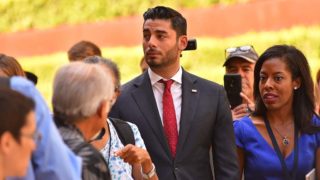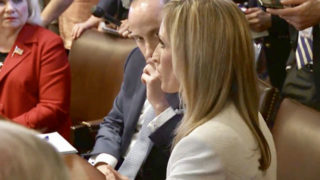February 27, 2020 (San Diego)-- The ballot for the March 3 primary in San Diego County is short but consequential, including candidates for President, Congress and Mayor of San Diego, as well as controversial ballot measures. It’s complicated by the chance you won’t get the Presidential ballot you need if you procrastinate.
Here is what you need to know to understand the candidates and prepare for the primary election in San Diego County.
President
California matters again in Presidential politics now that its primary has been moved up to Super Tuesday instead of languishing near the end. President Trump is certain to be chosen by the Golden State’s dwindling number of registered Republicans, but 20 Democratic contenders are seeking votes from both registered Democrats and the growing ranks of independent voters.
The big questions is whether those independent voters — technically registered “no party preference” — will get the right ballot. If you show up at the polls on Election Day, you can simply ask for a Democratic ballot. But if you vote by mail, you have until Feb. 25 to contact the Registrar of Voters and ask for a Democratic ballot. Otherwise, the Presidential candidates won’t be on your ballot.

At the left in this primary are avowed “democratic Socialist” Bernie Sanders, who is now officially a member of the Democratic Party after decades as an independent, and Massachusetts Sen. Elizabeth Warren. Toward the center are South Bend Mayor Pete Buttigieg, Minnesota Sen. Amy Klobuchar, former Vice President Joe Biden and former New York Mayor Mike Bloomberg. California’s own Tom Steyer is a wildcard.
Sanders is leading in many polls, but Bloomberg is spending vast sums on political advertising and is seeing a growing number of California endorsements. By skipping the early primaries in tiny states, Bloomberg hopes to make a splash on Super Tuesday, especially with 495 delegates up for grabs in the Golden State.
It’s no secret that Trump would like to run against Sanders, and that his campaign most fears centrists like Biden and Bloomberg, but there’s growing Democratic enthusiasm for a progressive candidate.
Congress
This primary ballot is notable for the familiar names running in new districts in the aftermath of the 2018 Democratic sweep.

Former Obama administration policy analyst Sara Jacobs, who finished a close second to Rep. Mike Levin in the 49th District in 2018, is leading in the polls in the race to succeed nine-term Rep. Susan Davis in the 53rd District. Jacobs faces San Diego City Council President Georgette Gómez, and Janessa Goldbeck, an impressive political newcomer who is endorsed by the San Diego Union-Tribune. The race is notable for significant national endorsements. Bernie Sanders has endorsed Gómez, but Jacobs has that backing of former centrist Presidential contender Rep. Eric Swalwell. The district in central San Diego County stretches east from Balboa Park through Mission Valley to East County and south to Chula Vista.
Back in the 49th District, Levin, a Democrat, faces Republican opposition from Brian Maryott, the mayor of San Juan Capistrano. Maryott, who finished a distant 8th in the 2018 primary, contends Levin is too much of a partisan Democrat for the district, which stretches along the coast from UC San Diego to south Orange County.

The 49th used to be represented by Darrell Issa, a Republican who retired from Congress in 2018.
Issa iss now running in the 50th District, where Rep. Duncan Hunter has resigned after pleading guilty to federal campaign finance fraud. Democrat Ammar Campa-Najjar, who narrowly lost to Hunter in 2018, is leading in the polls. However, Issa and the two other Republicans — former San Diego City Councilman Carl DeMaio, a transplant like Issa, and state Sen. Brian Jones — hope to place second and combine the Republican vote to ultimately win in November.
Issa and DeMaio have concentrated on attacking each other, while Jones stresses that he’s the only Republican candidate who actually lives in the 50th. The conservative district covers most of East County and was represented for decades by the Hunter family.
Incumbent Reps. Scott Peters and Juan Vargas face only token opposition in the 52nd and 51st Districts.
State Offices
State Sen. Toni Atkins, who serves as Senate president pro tem and has a major impact on legislation across California, is running for re-election in the 39th District. She is unopposed.
Brian Maienschein in his office in Sacramento. Image from Twitter feed
Another San Diego County politician with statewide influence, Assembly Republican Leader Marie Waldron, is also running for re-election and faces only token Democratic opposition. Incumbents Randy Voepel in the 71st District, Tasha Boerner Horvath in the 76th District and Shirley Weber in the 79th District have only minor opposition.
There’s a surprising twist in the 77th District, where centrist Brian Maienschein switched from the Republican to the Democratic party and now faces Republican opposition from June Cutter, an attorney and small business owner.
In the the 78th District, San Diego City Councilman Chris Ward is seeking to follow in the footsteps Todd Gloria, who represented Ward’s district before being elected to the Assembly and is now running for Mayor of San Diego.
Democratic Assemblmember Lorena Gonzalez in the 80th District has been criticized for her Assembly Bill 5, which seeks to turn most independent contractors into shift employees, and Republican John Vogel has sought to capitalize on the opposition. But the 80th District is solidly Democratic.Court Juges
There are four Superior Court offices on the ballot. The San Diego County Bar Association issued its customary evaluation on Feb. 7, labeling at least one candidate as “exceptionally qualified” for each office:
- Office 18 — Roberta Wilson, an attorney known for her work in consumer fraud cases.
- Office 22 — Both Alana Wong Robinson, an assistant U.S. attorney, and Mark Skeels, senior chief deputy city attorney in San Diego. Robinson is the daughter of Mexican and Chinese immigrants and is known for prosecuting human trafficking cases. Skeels is a former professional baseball player and Stanford University graduate.
- Office 30 — Paul Starita, an assistant U.S. attorney who is also a Marine Corps judge advocate.
- Office 36 — Michelle Ialeggio, a deputy district attorney who is an expert in legal ethics.
School Boards
It’s an off year for school board races, but voters will find two contested seats on the San Diego Unified School District Board of Education, as well as trustees seeking re-election to several other educational boards.

In San Diego’s District A, which encompasses Mira Mesa, University City, Clairemont and Kearny Mesa, health-care educator Sabrina Bazzo, entrepeneur Stephen Groce and university professor Crystal Trull are vying to succeed John Lee Evans, who is stepping down after three terms. Bazzo has been endorsed by Evans and two teachers unions.
Trustee Richard Barrera is unopposed for re-election in District D in central San Diego. Trustee Sharon Whitehurst-Payne, who came back from a primary loss to win the election in 2016, faces education leader LaWana Richmond in District E, which covers southeastern San Diego.
On the San Diego County Board of Education, Mark Powell, Guadalupe González and Paulette Donnellon are seeking new terms, as are Bernie Rhinerson and Mary Graham on the San Diego Community College District Board.
Elena Adams is seeking re-election as a governing board member of the Grossmont-Cuyamaca Community College District, but one seat is open, with Grossmont High School teacher Julie Schorr and entrepreneur Bartosz Murawski vying for it. Schorr is endorsed by the county Democratic Party.
San Diego County Board of Supervisors
This could be the year that Democrats become the majority on the nominally nonpartisan Board of Supervisors after a quarter century of Republican dominance. If two of the three districts up for grabs ultimately go Democratic in November, that party will have a 3-2 majority.

In District 1 in the South Bay, only Democrats are running. With Greg Cox, a Republican, termed out after 25 years, Port Commissioner Rafael Castellanos faces state Sen. Ben Hueso and Nora Vargas, president of the Southwestern Community College governing board. Castellanos is the first in his family to graduate from college, and won a scholarship to study law at the University of Chicago, where Barack Obama was one of his professors. Huseo is a former San Diego City Councilmember who has served in the state Legislature since 2010. Castellanos is endorsed by the mayors of of Chula Vista, Imperial Beach and Lemon Grove, while Hueso is backed by Rep. Juan Vargas, state Sen. Toni Atkins and Mayoral candidate Todd Gloria. Vargas is backed by influential Assemblymember Lorena Gonzalez.
Supervisor Diane Jacob is termed out in District 2 after 27 years. Two Republicans, former state Assemblyman and Senator Joel Anderson and Poway Mayor Steve Vaus, are vying to represent the sprawling district in East County. Jacob, who is known for her independence, has endorsed Vaus, but the county Republican Party is backing Anderson. Vaus is a Grammy Award-winning country singer who won praise for his community building efforts in the wake of the Poway synagogue shooting in 2018. Anderson sought a State Board of Equalization seat in 2018, but lost to a relatively unknown Democrat in that wave election.

In District 3, incumbent Republican Kristin Gaspar faces two accomplished Democrats, Escondido City Councilmember Olga Diaz and Obama administration advisor Terra Lawson-Remer. Gaspar has emerged during her first term as a conservative Republican, notably on immigration, voting against a shelter for recent migrants and joining President Trump in Washington twice to show support for his policies.
The two Democrats are a study in contrasts. Diaz is the first in her family to graduate from college, and the first Latina on the Escondido council. During her decade on the council, she was known for pushing back against the anti-immigrant housing ordinances of Mayor Sam Abed, who joined Gaspar on one trip to Washington to support Trump. Diaz works as a dean at Palomar College.
Lawson-Remer is a Yale-educated attorney, economist and UC San Diego professor whose career includes projects for the United Nations, World Bank and Amnesty International. She grew up in San Diego and led the “Flip the 49th” effort to oust Rep. Darrell Issa in 2018. She has some very-high-profile endorsements, including Rep. Adam Schiff of impeachment fame, state Sen. Toni Atkins and United Farm Workers co-founder Dolores Huerta. Diaz’ endorsements include Supervisor Nathan Fletcher, state Assemblymember Tasha Boerner Horvath and many union locals.
Mayor of San Diego

For nearly a year, it looked like an all-Democratic race with City Councilmember Barbra Bry and state Assemblymember Todd Gloria as the leading candidates. Then, at nearly the last moment, City Councilmember Scott Sherman, a Republican, joined the nominally nonpartisan race to succeed Mayor Kevin Faulconer in America’s 8th largest city.
Bry, an tech entrepreneur who founded Run Women Run to engage women in politics, has positioned herself as a defender of San Diego neighborhoods. She has called for restrictions on short-term rentals, continued limits on building heights and more regulation of dockless scooters. She has notable endorsements from Father Joe Carroll and Supervisor Dianne Jacob.
Gloria, who was a City Councilmember and briefly Interim Mayor, is more of a “YIMBY,” noting that “to provide opportunities for our children and grandchildren to live in San Diego, we must increase the supply of housing.” He proposes “sensible short-term vacation rental regulations” and hasn’t labeled scooters as a major problem. Both the San Diego County Democratic Party and San Diego Regional Chamber of Commerce have endorsed Gloria. If elected, Gloria would be the first LGBTQ mayor of the city.
Like Gloria, Sherman wants more housing development and sees scooters as a transportation solution, not a problem. Gloria has consistently led in the polls, but Sherman has edged ahead of Bry in recent surveys.
City Attorney
City Attorney Mara Elliott is seeking re-election to a second term as the city’s top lawyer. Like Gloria, she is backed by both the county Democratic Party and the chamber of commerce. Elliott has endured criticism over negotiations with San Diego State University for purchase of the former Qualcomm Stadium site and privacy issues with smart streetlights. But it turns out video from the streetlights has helped police solve a number of high-profile crimes.
Opposing her is public advocacy lawyer Cory Briggs, who has brought lawsuits against many high-profile local companies and institutions, not always successfully. He has been highly critical of Elliott, accusing her of giving the city bad advice, but has endured his own criticism over legal tactics.
Also in the race is Pete Mesich, a deputy city attorney with a background in land use and environmental law.
San Diego City Council
Four San Diego City council members are termed out and one is seeking a federal office, so a large number of new faces are vying for traction in the primary.
In District 1, which encompasses the city’s northwestern neighborhoods, Barbara Bry is termed out and running for Mayor. Firefighter and Navy reservist Aaron Brennan, community leader Joe LaCava, attorney Will Moore, tech executive Harid Puentes and small business owner Sam Nejabat are vying to fill the seat. Brennan stresses his understanding of public safety, LaCava his service on city advisory boards and civil engineering license, Moore his new ideas for boosting housing construction, Nejabat his desire to “give back” to the community, and Puentes his data-driven approach. The county Democratic Party did not make an endorsement, but ranked Brennan, LaCava, Moore and Puentes as qualified. The chamber of commerce endorsed Moore.
In District 3, where Chris Ward is termed out and running for the state Assembly, city budget analyst Chris Olson picked up the chamber of commerce’s endorsement, but the county Democratic Party is backing nonprofit leader Stephen Whitburn. Also in the race are political strategist Adrian Kwiatkowski and Toni Duran, district representative for state Sen. Toni Atkins.. The district encompasses some of the most urban parts of San Diego, including downtown, Bankers Hill, Hillcrest, Mission Hills, North Park and University Heights.
In District 5, Mark Kersey is termed out. Vying for the district that stretches along Interstate 15 from Scripps Ranch to the San Pasqual Valley are attorney and small business owner Joe Leventhal, Deputy City Attorney Marni von Wilpert and tech entrepreneur Isaac Wang. The county Democratic Party is backing von Wilpert, while Levanthal, who served on the city’s ethics commission, has the endorsement of the chamber of commerce.
In District 7, Scott Sherman is termed out and, like Barbra Bry, running for mayor. The leading candidates are Deputy City Attorney Raul Campillo, attorney and mediator Monty McIntyre, gun-control advocate Wendy Wheatcroft and restaurant owner Noli Zosa. There are a lot of high-profile endorsements in this race. Wheatcroft is backed by Assemblymember Lorena Gonzalez and Rep. Scott Peters. Zosa, who owns the Dirty Birds chain, has Father Joe Carroll, Sheriff Bill Gore, Supervisor Diane Jacob, Mayor Kevin Faulconer and the chamber of commerce in his camp. Campillo is endorsed by the county Democratic Party and a number of labor unions.
Finally, in District 9, Georgette Gómez’ is vacating her seat to run for Congress. Among those in the race to succeed Gómez are her former policy advisor, Kevin Barrios, small business entrepreneur Sam Bedwell, and community college trustee Sean Elo. Barrios is backed by Gómez and a number of elected officials in the South Bay, while Elo is endorsed by many education leaders and Rep. Scott Peters.
Chula Vista City Council
There are elections for two districts in San Diego County’s second-largest city. In District 3, former Mayor Steve Padilla is seeking a second term on the City Council following the end of at-large elections. Padilla also serves on the California Coastal Commission. In District 4, incumbent Mike Diaz faces community organizer Andrea Cardenas, and small business owner Delfina Gonzalez. Cardenas has picked up high profile endorsements from Assemblymember Lorena Gonzalez and Nora Vargas, president of the Southwestern Community College governing board.
Carlsbad City Council
In her bid for re-election to the Carlsbad City Council, Cori Schumacher faces community volunteer Simon Angel and nonprofit executive Tracy Carmichael. Schumacher, a championship surfer, is endorsed by the San Diego County Democratic Party, while the San Diego County Republican Party has endorsed Carmichael.
Ballot Measures
There’s only one state measure on the ballot, but its official designation that will confuse many Californians — Proposition 13. This one doesn’t cut taxes, but instead authorizes up to $15 billion in bonds to repair and modernize public schools. It also cuts fees for developers who build high density housing, like apartments and duplexes, and near transit — the kind of housing teachers can afford. It would only raise taxes if local school boards choose to issue bonds for matching funds. There is widespread support for this measure.

Three controversial ballot measures seek to control housing development amid a growing shortage that is raising prices and rents across the region. The measures pit established homeowners and the status quo against new construction to house San Diego County’s growing population.
Measure A, popularly known as Safeguard Our San Diego Countryside, seeks to force all new housing to comply with the county’s nine-year-old general plan, which limits new housing development to existing rural centers like Alpine, Borrego Springs, Fallbrook, Lakeside, Ramona and Julian. Any project that adds just six homes more than allowed by the general plan would be required to be placed before all county voters. That would effectively remove the Board of Supervisors from being able to make even minor adjustments to the plan.
Opponents say the measure would halt most housing development outside of cities, while proponents say the general plan still allows plenty of new construction. Measure A is supported by the League of Women Voters, the Sierra Club and a host of local environmental groups, but opposed by a wide swath of election officials, from Supervisor Nathan Fletcher on the left to Assemblymember Randy Voepel on the right. Will Rodriguez-Kennedy, chairman of the county Democratic Party, said passage of the measure would “contribute to economic and racial segregation.”
Measure B would ratify a specific general plan amendment permitting a large home development along Interstate 15 northwest of Escondido. It’s exactly the kind of change to the general plan that Measure A seeks to ban going forward. The Newland Sierra project would add 2,135 homes, 81,000 square feet of commercial space, a six-acre school site, 36 acres of parks, 19 miles of trails, an equestrian staging area and over 1,200 acres of open space. After the supervisors approved the project, opponents gathered enough signatures to force a vote. Major funding for the opposition came from owners of the exclusive Golden Door Spa, which is across Deer Springs Road from the site.

Del Mar’s Measure G is the development issue in microcosm. The bluff on the city’s north end is currently privately owned, fenced and zoned for up to 16 gated mansions. The Marisol project would instead construct a 65-room boutique hotel, 31 condominiums and 22 affordable housing units, all surrounded by new public walking trails. Opponents want to “save our bluff,” but proponents note the tiny coastal city will benefit from a significant increase in property taxes and finally be able to meet the state-mandated affordable housing requirement.
Measure C in San Diego would increase taxes on out-of-town hotel guests to finance expansion of the downtown Convention Center and provide ongoing funding for homeless programs and street repairs. Over a 40-year period, taxing hotel guests would generate $850 million for the convention center, $750 million for homeless programs and $400 million for street repairs. It’s a new tax, but not one San Diegans would feel — unless they frequently stay overnight at local hotels. Proponents include Father Joes Villages, Veterans Village and the San Diego County Taxpayers Association. There are a few vocal opponents, who argue that the city can’t be trusted to spend the money wisely.
Measure D is a widely supported change in the city charter that will clarify how the City Auditor is chosen.
There are six proposed School Bond Issues on the ballot. It’s hard to argue against money for schools, but not all bond issues are fiscally responsible. The San Diego County Taxpayers Association has analyzed the proposals and recommends approval of Measure L for Cajon Valley, Measure Q for Escondido and Measure P for Poway. But the taxpayers association says voters should reject Measure M for Chula Vista, Measure R for Lakeside and both Measures T and U for San Ysidro












Recent comments